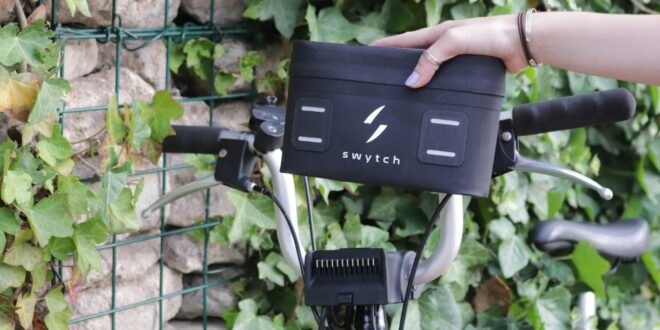While e-bikes present a revolution in urban transport, the cost may still be prohibitive for many potential riders. Myles Warwood investigates a lower-cost alternative – the conversion e-bike
This piece first appeared in the September edition of BikeBiz magazine – get your free subscription here
 The bike market is showing sudden signs of a slowdown following the coronavirus pandemic, but e-bike sales continue to take up more market share. But as the prices of bikes have jumped dramatically in recent years, commuters and leisure riders may be put off splashing out on a new e-assisted bike, and instead look to cheaper alternatives away from the shop floor.
The bike market is showing sudden signs of a slowdown following the coronavirus pandemic, but e-bike sales continue to take up more market share. But as the prices of bikes have jumped dramatically in recent years, commuters and leisure riders may be put off splashing out on a new e-assisted bike, and instead look to cheaper alternatives away from the shop floor.
What if the consumer already has a bike in their shed and they don’t want to fork out the money for a brand new e-bike? Well, Swytch has thrown its product into the market, essentially an e-bike conversion kit that adapts almost any machine into an electrically-assisted cycle.
New developments
E-bike conversion kits are no new thing, there have been on-the-wheel and in-the-hub conversions around for a while now and riders have also been able to purchase a motor to place in their crank if they wanted to. Many variations, of varying reliability and safety credentials, can be purchased through online marketplaces like Amazon.
But Swytch aims to offer a safe, reliable, and affordable option to convert an old mechanical bike into something more – understandably attractive to the frugal consumer. Swytch started life as a crowdfunded business and delivered over 5,000 units worldwide, essentially market research while developing its product.
Now, it has returned for round two: a front wheel with the electrical motor hub attached and a lightweight battery pack that clips on to the handlebars. All the consumer needs to do is install the front wheel and the battery, and cable tie everything into place.
The battery pack is mounted onto the handlebars and contains a 36v lithium-ion battery which is good for 250Wh and can last up to a claimed 50km and recharge in three hours. When the rider starts pedalling, the pedal sensor sends a signal to the power pack which then sends power to the motor, all designed around a 12-magnet cadence system that makes the Swytch smooth and steady in power delivery.
Game changers?
Swytch says this new kit is a “game-changer” and that “it’s going to totally disrupt the e-bike industry because it’s so much lighter, smaller and more affordable than anything else out there.” But what does that mean for the local bike shop?
The Swytch is definitely a bridge between the two bikes, the ‘conventional’ push bike and an e-bike, but it’s one that doesn’t quite join the two. Swytch is selling directly from its website, so it’s not something that retailers will be able to make the most of, and they might not necessarily want to, owing to complications in maintenance and potential warranty issues.
 Olympian backing
Olympian backing
Swytch is not the only one offering this aftermarket conversion – for £1,000 consumers can now purchase the
Sir Chris Hoy backed Skarper, which also promises to transform any bike into an e-bike. This kit is incredibly simple as it just clips onto any bike, giving the rider electrical watts at their disposal.
Sir Chris Hoy, who has been involved in the development of the product from the beginning said: “I’ve always been an advocate of getting more people on bikes, regardless of their fitness, ability or age, and I’ve discovered that e-bikes can play a huge role in making cycling more accessible to anyone.” So then, it seems this is something more than just a pet project for Sir Chris but something which we all share a passion for, getting more people on bikes.
Dr Alastair Darwood, the brains behind Skarper, said: “The Skarper system is fully enclosed and wire-free, seamlessly integrating into your bicycle via its DiskDrive technology. It is an ultralight, clip-on motor technology, transforming any bike into an e-bike with no modification required to the frame or wheels, and without compromise on performance. We are also very excited to be working with Red Bull Advanced Technologies on an off-road version, news of which will be released later this year.”
While Skarper’s claims that it transforms any bike into an e-bike look good, they only mean that they will transform any disc brake bike into an e-bike as it’s the motor that drives the disc brake to make up the assisted power. And with prices starting from £1,000, the jump to a conventional e-bike is not huge.
For both manufacturers and bike shops, they’re head-scratchers. If they were sold in bike shops as well as direct from manufacturers they could be a great string to the salesperson’s bow as a stepping stone to a fully-fledged e-bike. As more manufacturers sell more disc brake bikes, it makes a lot of sense, but will it also stop a consumer from purchasing an e-bike?
 Sir Chris said: “It opens up opportunities – whether it’s making a commute possible which would otherwise have been too difficult, keeping pace with a fitter friend for a challenging bike ride, returning to riding after an injury or illness, or just going further on your rides and seeing more for the same effort. E-bikes offer something for us all; I even take my kids to and from school on an e-cargo bike which they absolutely love!”
Sir Chris said: “It opens up opportunities – whether it’s making a commute possible which would otherwise have been too difficult, keeping pace with a fitter friend for a challenging bike ride, returning to riding after an injury or illness, or just going further on your rides and seeing more for the same effort. E-bikes offer something for us all; I even take my kids to and from school on an e-cargo bike which they absolutely love!”
Both products are scheduled to be released in 2023, but whether they will disrupt and shake up the market as much as promised is yet to be seen.
 micromobilitybiz Delivering news updates to the micromobility industry, focusing on e-bikes, e-scooters and green transport
micromobilitybiz Delivering news updates to the micromobility industry, focusing on e-bikes, e-scooters and green transport




